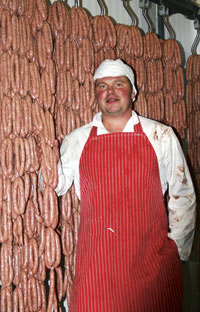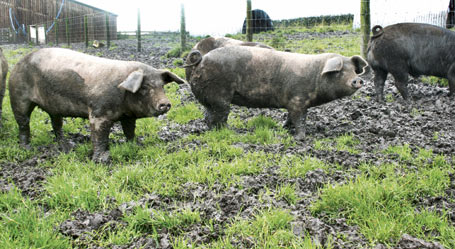Pig enterprise invests £250,000 in butchering plant

Making a profit out of pigs can be a precarious business, but a Lancashire family has just invested £250,000 in a new on-farm cutting plant to butcher and process its own outdoor-reared pork for direct retail sales and to supply a leading supermarket.
The father-and-son team of Tony and Ben Holland set up their Bowland Outdoor Reared Pork business 10 years ago on a hill farm in the Forest of Bowland at Bentham, near Lancaster.
“When we started in pigs, we were under the misapprehension that if you produce the best pigs on the best system, you get the best price,” says Tony Holland. “But that just doesn’t happen. We were getting £70 a pig and it was costing us that to produce them. So to try and keep as much of the margin as possible, we started to sell our pork direct.”

But expansion plans were thwarted on the Hollands’ original farm and it took six years to get planning permission on another site at Southmire Farm, Lowgill, where the new outdoor unit and cutting plant are situated.
From the early days of making sausages on the kitchen table, the family developed a thriving demand for its outdoor-reared pork at farmers’ markets. Along with a range of pork products, they now produce 0.75t of sausages every week.
“We appeal to consumers because all our pigs are finished outside in paddocks on a natural system,” says Ben. “But we aren’t organic and we use hybrid pigs and not rare breeds because we need a lean carcass and commercial growth rates. Things are going well, but it’s a constant challenge. We’ve got to be on the ball when it comes to marketing.”
Like many other businesses that have relied on the “home-produced” marketing image, the Hollands say that although farmers’ markets are still popular with consumers, demand is levelling off and competition has increased as more farmers try retailing their own meat.
Spurred on by winning a fistful of regional food awards – including North West Fine Foods Producer of the Year and Best Pork and Best Sausage awards in 2004 – the family pressed ahead with the purpose-built cutting plant and began to look for new bulk buyers to supplement the many farmers’ markets they attend each week.
“But we soon found that applying for planning for a butchery and cutting facility on a farm 700ft up in the hills was fraught with difficulty,” says Tony. “Originally, we wanted to construct it within a new agricultural building, but that wasn’t allowed. We’ve had to construct a new building measuring 250ft x 60ft made up of several individual rooms.
“It’s a double-insulated building built to the highest hygiene standards. It’s cost us £250,000, but we’ll be able to expand our pork butchery and packing and develop our market for home-produced Aberdeen Angus beef.”
Tony has also created a range of sausage recipes, including the increasingly popular “Manchester Dangler“.
An approach to Morrisons supermarket proved successful and the Hollands are now supplying sausages to 14 stores. “It’s not easy getting products into the big outlets, but if you really believe in what you are producing, it’s the only way of reaching a volume market,” says Ben.
Since moving to the new site, the Hollands have latterly been buying in weaners, but are now re-establishing their own herd of breeding sows to meet the growing demand for their pork and bacon.
Weaners are reared in arks in half-acre paddocks and fed an ad-lib bought-in ration along with organic whey from a Lancashire cheese producer. The cutting plant is currently handling up to 30 pigs a week.
“We buy 2000 litres of cheese whey a week and feed it twice a day,” says Ben. “Weaners stay in the paddocks until they reach 110kg liveweight to give us a 75-80kg carcass. We were the first to use the term ‘outdoor reared’ when we started 10 years ago. It simply tells the consumer that these pigs are not intensively reared and for most, that’s even more important than being organic.”
Although the Hollands’ award-winning sausages deserve sustained success in the future, the family know they must produce quantity as well as quality in their bid to maintain a profitable pig enterprise.
